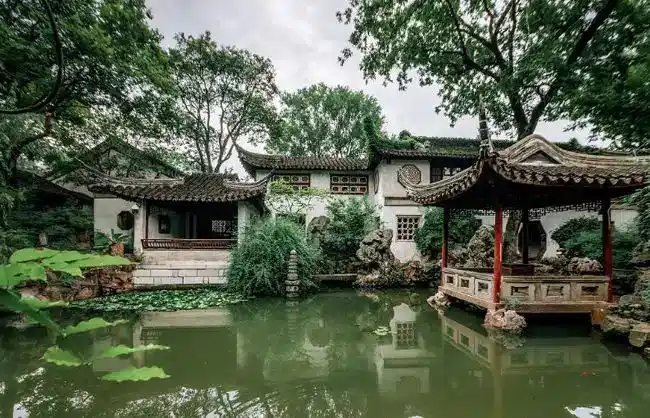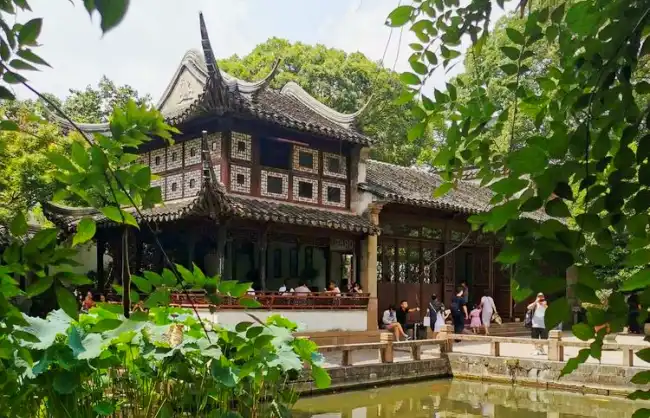The Lingering Garden in Suzhou is known as Liuyuan (留园) in Chinese. It has been recognized as a UNESCO World Heritage Site. It is considered one of the four greatest classical gardens in China, alongside the Humble Administrator’s Garden, Summer Palace, Chengde Mountain Resort.
Xu Taishi, a former Ming Dynasty official, constructed the Lingering Garden in 1593 as an elegant haven for himself. During Qing Dynasty, Liu Rongfeng bought the garden, and because of his family name, the locals called it Liu’s Garden (刘园). And then many years later, no one took charge of the garden. Visitors loved it so much that they always lingered in it, so people started to call it Lingering Garden.
With an area of 5.7 acres (2.3 hectares), Lingering Garden has a meticulous arrangement of pavilions, corridors, rockeries, and ponds. The four parts of the garden, the central, eastern, northern, and western sections, each has their unique style. It is a prime representation of Jiangnan aesthetic.
Fast Facts about the Lingering Garden
- Location: No. 338 Liuyuan Road, Gusu District, Suzhou City, Jiangsu Province
- Hours: 07:30-18:00
- Ticket price: CNY 55 on season (April to October), CNY 45 off-season (November to next March)
- Visit time: 2 or 3 hours
- Best time of the year: April to October
- Suited to: garden lovers, history lovers, photographers
- Highlights: Celestial Hall of Five Peaks, Cloud-Capped Peak, Small Penglai Isle, Garden Museum

What to See and Do in the Lingering Garden
Celestial Hall of Five Peaks
Celestial Hall of Five Peaks is in the eastern section of Linger Garden. It is the largest and most elegant hall here. It has a double-eave roof and five round windows. The hall exhibits a wonderful collection of calligraphy works and paintings.
You’ll notice many perforated windows when you visit Lingering Garden, a special highlight. Many of them have patterns including stony patterns and wooden patterns.
Cloud-Capped Peak
Also in the eastern section is the Cloud-Capped Peak. It is a 21.3-foot (6.5-meter) tall limestone rockery, the most famous shaped stone in the garden. It was relocated to the Linger Garden from Lake Taihu. The shape of it resembles a towering mountain peak, is a wonder to behold in person.
Small Penglai Isle
The central section is the most celebrated part of the Lingering Garden. It is built upon a lake, and the artificial island in the lake is called Small Penglai Isle. The isle is given a pavilion, a bridge, a corridor, and a piece of rockery. It’s small but very complete like its own small world. Its name draws inspiration from the legendary fairyland of Penglai in Chinese mythology.
Xiaotaowu House
Xiaotaowu House is in the northern part of the Lingering Garden. In this section, you’ll see plenty of bamboo fences and courtyard around Jiangnan folk dwelling. There are bonsais decorating the pathways and houses.
Traditional Art Performances
Every spring, there’s a 30-day long event called “seeking the dream of the Lingering Garden.” There will be ushers dressed in traditional Jiangnan outfits at the gate of the garden to greet you. There are also actors dressed up as owners, steward, and servants to interact and take photos with you. It’s like stepping into a dream across the history.
In the Exhibition Hall, there are opera performances every few hours, including Kunqu Opera, Suzhou Opera, and Wuxi Opera. Kunqu opera is recognized as Worldwide Intangible Cultural Heritage, while Suzhou Opera and Wuxi Opera are recognized nationally. These different genres featuring Wu characteristics are representative of traditional Wu art.

Small Penglai Isle in Lingering Garden
Best Time to Visit the Lingering Garden
The best season for your Suzhou tour to the Lingering Garden is spring. The weather is very nice with sunshine and comfortable temperature. A wide range of flowers are in bloom, including azaleas, peonies, and orchids. It’s best to plan your trip on a weekday rather than a weekend, as the Lingering Garden can get pretty crowded.
You May Like Suzhou Weather in Different Seasons
How to Get to the Lingering Garden
By Bullet Train: If you travel to Suzhou from some other city in China, taking a bullet train is the easiest way. For example, it takes only about 30 minutes to get from Shanghai to Suzhou. Then transfer to a bus, metro, or taxi to reach the Lingering Garden.
By Bus: Take tourist bus NO. 1, city bus NO. 85, or 933 to the Lingering Garden station.
By Metro: Take metro line 2 to Shilu Station, which is a 0.9-mile (1.5-kilometer) walk to the garden.
By Taxi: Take a taxi to the Lingering Garden from anywhere in Suzhou. The fares from Suzhou Railway Station and Suzhou North Railway Station are around CNY 15 and CNY 30.
You May Like How to Get to & Travel Around Suzhou
Attractions nearby the Lingering Garden
Humble Administrator’s Garden is another one of the four most celebrated gardens in Suzhou, among them, it is the largest classical Chinese garden. Humble Administrator’s Garden is praised for its landscapes and especially water features.
Master of the Nets Garden is the smallest but most exquisitely designed classical garden in Suzhou. It’s known for its meticulously planned layout and elegant structures.
Tiger Hill is a renowned scenic spot in Suzhou, featuring the iconic leaning Yunyan Pagoda, the Sword Pool, the Tomb of King He Lu, and other historical and cultural relics.
Shantang Street is often referred to as “the First Street in Suzhou” for three reasons. It has a history of nearly 1,200 years; it is representative of local architecture; it is associated with distinguished people and events.
The Suzhou Museum is designed by the well-known Chinese American architect Mr. Ieoh Ming Pei (贝聿铭). Pei lived in Suzhou during his childhood, so you’ll find many typical elements of Suzhou gardens and Jiangnan architecture at the museum. With an area of 12,797 square yards (10,700 square meters), Suzhou Museum is home to over 40,000 historical and cultural, including jade, ceramics, bronze, stone, ivory.
Suzhou Silk Museum reveals the fascinating history and intricate craftsmanship behind Suzhou’s renowned silk industry through engaging exhibits and captivating demonstrations.









